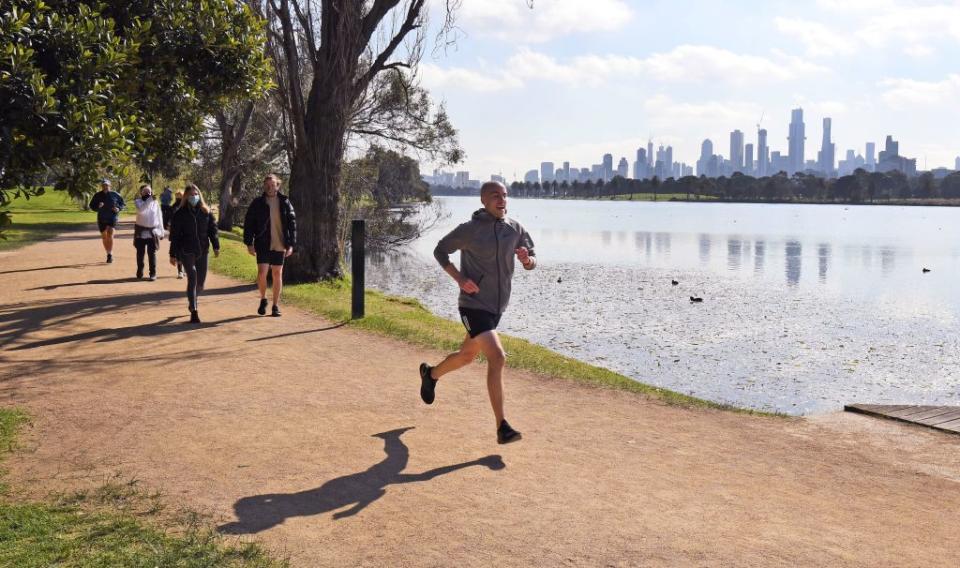Worrying new map emerges amid Melbourne lockdown 2.0
Melbourne’s Stage Four coronavirus restrictions are taking their toll on hundreds of thousands of Melburnians who are bound to their homes except to grocery shop or exercise for an hour a day.
Those who do crave a bit of fresh air are not able to move beyond a five kilometre radius of their home.
A worrying new map reveals about 340,000 Melburnians have little or no access to a park within their permitted 5km boundary, making lockdown more detrimental to their mental health.

A map created by health academics at Victoria’s La Trobe University and Griffith University in Queensland, shows a large area of inner Melbourne and surrounds are deprived of parkland within the five-kilometre radius.
“Of the 42,199 residential mesh blocks currently under Stage Four restrictions, 3496 have between 0 and 4.5 square kilometres of parkland within five kilometres,” the experts wrote for The Conversation.
“This equates to about 135,000 homes or 340,000 people with little or no access to parks within their permitted area for exercising.”
The Melbourne suburbs deprived of parks
According to The Conversation, residents in Cardinia, Mornington Peninsula and Melton had the least access to parkland within a five-kilometres radius.
Those in Knox, Yarra and Banyule were at an advantage with the highest amount of parks and green space in the area.
The study suggest the government should consider special provisions for those who do not have access to a park.

“Our findings confirm that some Melburnians are more fortunate than others in their ability to access urban green space during Stage Four lockdown,” the article says.
“For those less fortunate, the state government should consider replacing the blanket five-kilometre rule with a special provision that allows people to travel outside this radius if they would otherwise be unable to access a park.”
The impact on mental health
Research fellow and psychologist at Black Dog Institute, Alexis Whitton, told Yahoo News Australia parks and green space had a positive impact on people’s mental health – something many Melburnians are deprived of during a stricter lockdown.
“Health studies that look at the association between mental health and green space show it has positive benefits as we think about the things we do in parks or while bushwalking,” she said.
“It’s likely you were physically active and had an opportunity to socialise if you went with friends and were likely unplugged from screens and devices – all these things have a positive effect on wellbeing and stress levels.
“One of the big things for people who don’t have access might be a feeling of not having anywhere to destress, and particularly with the added stress, their desire to get out amongst the trees to cope could be even stronger.”
Dr Whitton said not being able to visit a park could be problematic for those who lived alone and wanted to be surrounded by others while exercising.
“It’s a place where people usually go to unwind but do it in a way where they are physically active and where there are other people around,” she said.
“The two things people are being staved of at the moment is social interaction and the ability to be active for larger portions of the day.
“People are finding themselves yearning for this green space and a large part of what they’re craving is social interaction and the ability to be physically active.”
Finding ways to alleviate stress
Dr Whitton added people needed to make their health a priority and find ways to alleviate stress.
“A lot of the emotions you can feel, feeling trapped and things like that, boil down to needing to find ways to manage stress,” she said.
“With a lack of green space, people can achieve similar benefits without a park by listening to nature sounds through headphones and by starting a little herb garden in the kitchen. It may not have as much of an effect as a wide, open space or walk in the wilderness, but it will touch on some of those things that combat stress.”
Dr Whitton said people should also attempt to develop a routine so the day doesn’t feel endless.
“A lot of people are performing different daily tasks in different areas of their home. They might work in the study or at the dining table for their work day and move to the kitchen or balcony for lunch. Once they’re finished their work day, they might head out for their exercise,” she said.
“Creating a routine, even though it’s on a microscale, you’re still creating some semblance of a routine by varying location and doing things to signal the start and end of the day.”
Dr Whitton again urged people to monitor drinking habits while in lockdown, with more people reaching for the bottle at the end of the day without the structure of a normal work hours.
“People are losing typical boundaries they would use to moderate their alcohol consumption combined with increased stress levels,” she said.
“It can make us more stressed and more likely to snap at people we are living with and become easily frustrated. People find they are drinking more but also are feeling more stressed – that could be undermining their ability to cope.”
Feeling worried or struggling to cope during the Coronavirus pandemic? Visit coronavirus.beyondblue.org.au or speak with trained counsellors on 1800 512 348.
Do you have a story tip? Email: newsroomau@yahoonews.com.
You can also follow us on Facebook, Instagram and Twitter and download the Yahoo News app from the App Store or Google Play.





